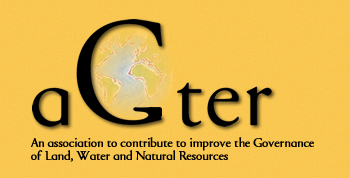|
|
||||||||||||||
|
|
The association AGTER runs an international network of people, exchanging and thinking together how to improve the governance of land, water and natural resources. The network selects and makes information available but it also formulates suggestions and alternatives to face the current great challenges. A quaterly newsletter presents the latest information available on our website : www.agter.asso.fr. Each newsletter is introduced with an editorial written by a member of AGTER’s network. Thousands of people died this year in China because of floods, landslides, typhoons. Hundreds of thousands if not millions of persons have lost all their possessions and their homes. Losses in cereals are estimated at a minimum of forty million tons in the first half of the year versus thirty millions for the whole year 2009. Global warming is blamed for the increased occurrence of heavy rainfalls which caused these disasters. But another question is at stake: has the devastating impact of rainfalls been exacerbated as a result of the process of expansion of industrial activities, mining and infrastructure construction at the expense of land previously used by local communities? In response to the catastrophic floods in 1998, radical measures have been taken to reduce the impact of natural disasters. First, the government ordered the construction of greater flood-control infrastructure, especially along the Yangtze River, where several sections of levees failed. Secondly, to curb erosion, one of the most ambitious reforestation programs world-wide has been launched with compensation payment to farmers to abandon steep cultivated land and plant trees. Logging has been strictly prohibited in all existing forests, including private ones. Meanwhile, the government’s highest priority remained economic growth, especially targeted to the less prosperous western regions. This strategy translates in the implementation of policies to spur investment and provide financial support to larger-scale agricultural structures. These measures are accompanied by the construction of infrastructuresfor the rapid expansion of the roads network and energy supply in urbanised areas. Expanded mining activities and construction of hydroelectric dams impact on watersheds ecosystems. Infrastructures may often be built at the expense of mountain land which is owned by local collectivities. Land use rights are transferred by local authorities against compensation. Considered as empty, the land was most generally used by rural communities for their livelihood activities such as grazing, harvesting of herbs or firewood collection. Given the large-scale impact of disasters, the Chinese State is encouraged by various actors, NGOs and researchers, to take steps to balance economic growth and environmental protection. The emphasised impact of climatic disasters on fragilised environments is not the only warning signal. The country has been hit by a series of high-profile industrial and environmental accidents: the largest recorded oil spill at the port of Dalian in mid-July, explosion at a plastics factory in Nanjing, barrels of toxic chemicals swept by floodwaters… Read here, a case study that illustrates how an industrial project undermines the peoples’ land rights in China. Furthermore, a thematic meeting on land issues in China should be held in Nogent-sur-Marne in mid-October. You will receive further information shortly. Sylvie Dideron Member of AGTER’s Board of Directors Miscellaneous At the request of the Land tenure and development’ technical committee and with funding from the Agence Française de Développement, AGTER has facilitated since June 2009 the reflections of a working group on large scale land appropriations. The result of this process is ublished under the title Large scale land appropriations : Analysis of the phenomenon and proposed guidelines for future action. This paper explores the meaning of the word investment and types of investment needed to ensure food security in the world and preserve the environment. Proposals of this work are built around two key ideas : 1. protecting existing rights to land and resources, and 2. the need to recognise collective rights that ensure compatibility between private individual uses/rights and the general interest. We emphasise that the problem of large scale land adquisitions cannot be addressed only relying on the good will of socially responsible businesses, nor on voluntary guidelines. We invite all concerned to work towards :
We wish to disseminate this essential work as widely as possible so that these proposals, very diferent from what has been discussed in international institutions, can find a wide echo and provide a basis for reflection to everyone involved in this topic. Thank you to spread it around you! The French, Spanish, and English articles and videos that we present here differ.
|
AGTER. Addres: 45 bis, avenue de la Belle Gabrielle, 94736 NOGENT SUR MARNE CEDEX, FRANCE
Telephone: +33(0)1 43 94 72 59 / +33(0)1 43 94 72 96
E-mail: agter@agter.org




